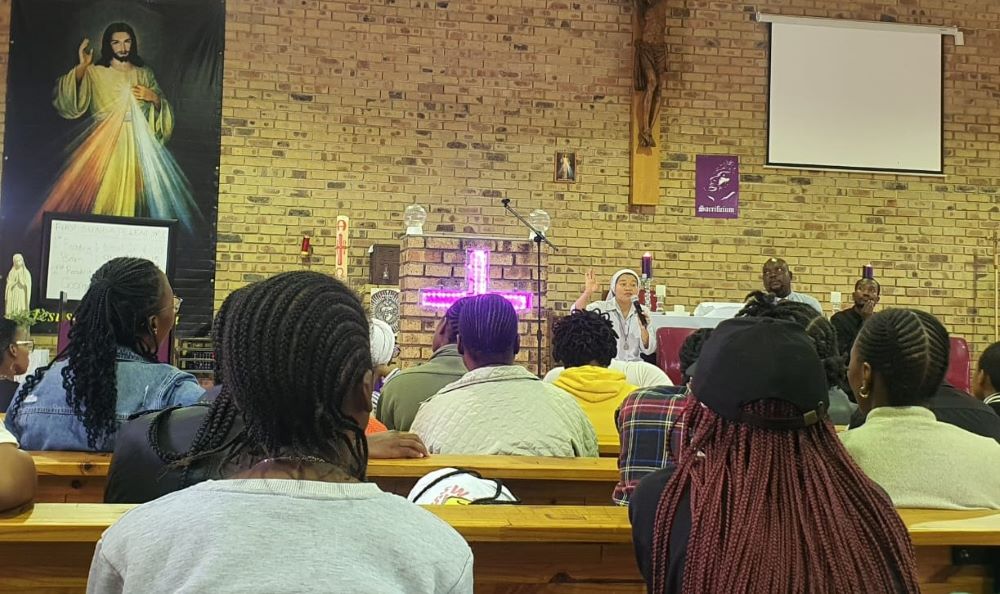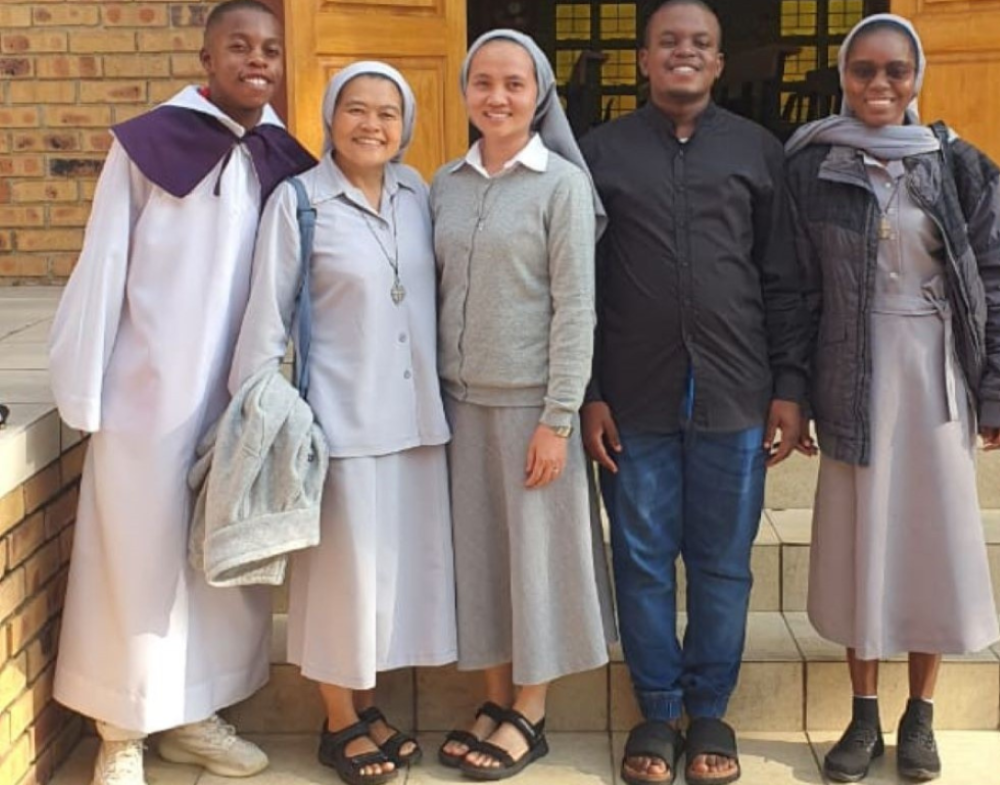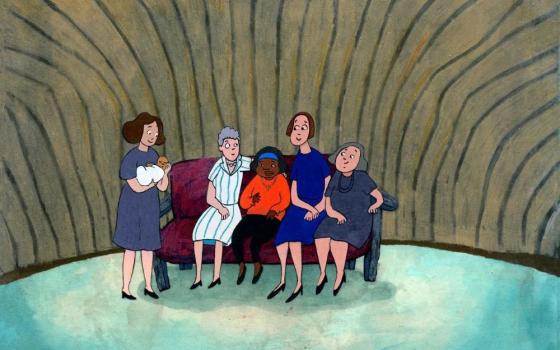Sr. Thao Phi, a member of the Franciscan Missionaries of Mary, has been empowering youth in South Africa to combat xenophobia through education and fostering acceptance. (GSR photo/Doreen Ajiambo)
Sr. Thao Phi, a member of the Franciscan Missionaries of Mary, stands as a beacon of hope in the face of escalating violence and xenophobia in South Africa. She provides guidance and support to people impacted by the ongoing turmoil. As an educator and advocate for peace, she is committed to confronting discrimination head-on and building bridges among marginalized communities, particularly those of foreign nationals.
In South Africa, xenophobia is the fear or dislike of foreigners or anything seen as foreign. It often shows up as hostility or violence directed toward immigrants and non-nationals, especially those from other African countries.
For the past 16 years, Phi, a native of Vietnam who grew up in Santa Ana, California, has focused on education, working with youth to foster an understanding of healing, reconciliation and acceptance. She believes that real change must begin with the younger generation. Her passion drives her to shape a future free from hate and prejudice.
"In every crisis, there is always potential for growth," Phi told Global Sisters Report.
South Africa, with a population of more than 63 million, is home to approximately 2.4 million residents born outside the country, representing just over 3% of the total population. These people primarily come from countries such as Zimbabwe, Somalia, South Sudan, Burundi, the Democratic Republic of Congo and Rwanda, as well as from outside the continent.
The southernmost African nation has long faced issues with violence and xenophobia, particularly aimed at foreign nationals. This has resulted in deaths and the destruction of homes and businesses. Deep-rooted racial and social disparities have led many South Africans to be intolerant of outsiders, which further deepens societal divisions. These issues, Phi said, trace back to the apartheid era, during which the minority white population segregated and mistreated the Black majority. The trauma from that time has persisted through generations, she said.
Since the end of apartheid in 1994, there have been at least 694 reported deaths, the looting of 5,648 shops, and the displacement of 128,849 individuals from their homes, according to Xeno Watch at the University of Witwatersrand. This violence has taken the form of large-scale riots as well as targeted attacks. In 2022, a Zimbabwean national was burned to death by a gang, underscoring the urgent need to address this alarming crisis.
Phi acknowledges the challenges stemming from South Africa's history.
"The violence and xenophobia that persist in South Africa today are the consequences of the apartheid system, which fractured society and fostered mistrust and animosity that has been passed down through generations," she said.

Sr. Thao Phi addresses the audience during a Lenten retreat for youth and young adults March 15 in Diepsloot, Johannesburg. Phi has been empowering youth in South Africa to combat xenophobia through education and fostering acceptance. (Courtesy of Thao Phi)
Phi is committed to teaching the importance of tolerance and acceptance. She encourages youth to engage in meaningful conversations about racism, mental health, and the history of xenophobia, aiming to instill values of empathy and respect. Phi organizes sessions on mental health with experts to provide young people with essential tools for managing their challenges. Additionally, her activities at the church foster a sense of community and belonging. By connecting these efforts with messages of acceptance, Phi seeks to help the younger generation heal.
"The hostility that emerged during apartheid has been passed down through generations, but it doesn't have to continue," said Phi, who is also the current secretary general of the Leadership Conference of Consecrated Life South Africa. "The youth hold the key to changing that narrative, and we are doing everything we can to break the cycle of hatred and fear."
GSR: Can you share how you started your journey addressing xenophobia, especially among youth?
Phi: My journey started 16 years ago when I was a teacher in this country. This role allowed me to interact closely with the locals, and through conversations with children and their parents, I gained valuable insights into their culture. This experience helped me understand and embrace the people for who they truly are. As a foreigner, I realized that I needed to accept the locals before they could accept me in return.
In my early years, I faced some hostility from a few individuals, but it was minimal, likely because I am a woman. Through these experiences, I came to understand that much of the prejudice stemmed from a lack of understanding and empathy. This realization motivated me to educate young people about the dangers of xenophobia and the importance of fostering an inclusive mindset.
Why do you believe that educating young people is essential in the fight against xenophobia?
Education is a powerful tool for combating ignorance, and I firmly believe in its potential to drive change. Young people are the future leaders of our societies around the world. They possess immense potential to influence the world, whether positively or negatively, but they can also be vulnerable to divisive ideologies.
By instilling values of compassion, understanding and solidarity in them from an early age, we can help them grow into adults who reject xenophobia and other forms of discrimination. Educating youth about our shared humanity, regardless of their backgrounds, is essential for creating a more just and peaceful world.
How do you engage with youth on these topics effectively?
The method I find most effective is storytelling, as it helps me connect with young people. I share personal stories of individuals who have overcome adversity, along with historical examples of reconciliation, to demonstrate the power of forgiveness and acceptance. I encourage open discussions where students can share their thoughts and feelings about prejudice, identity and community. It's essential to create a safe space where they feel heard and respected.

Sr. Thao Phi, second from left, poses with other sisters in Diepsloot, Johannesburg, on March 15 after addressing youth and young adults about combating xenophobia. (Courtesy of Thao Phi)
I also organize interactive activities, such as role-playing and workshops on empathy, to help them step into others' shoes. During holidays, especially when most schools are closed, we hold workshops on various topics that affect the youth. These workshops take place in nearly all the parishes, particularly here in Johannesburg and Pretoria. Through these sessions, we foster a deeper understanding of different perspectives.
In your opinion, what role do healing and reconciliation play in overcoming xenophobia?
I believe that healing and reconciliation are essential for overcoming xenophobia, as this fear often arises from ignorance, pain or fear itself. Addressing these underlying issues requires a healing process on both an individual and collective level. Reconciliation fosters peace and bridges divides between people.
Without healing, wounds can fester and resentment can grow. Without reconciliation, we risk becoming trapped in cycles of mistrust and division, which can lead to violence. By teaching young people how to heal and reconcile, we are planting the seeds for a more compassionate and united world.
While we cannot always control how someone processes pain or chooses to heal, I do my best, and I trust that divine guidance will support the rest.
What challenges have you encountered in this work, and how have you managed to overcome them?
One of the biggest challenges we face is confronting deeply ingrained biases. Xenophobia can be perpetuated by families, communities and even institutions, making it difficult for young people to unlearn harmful ideas.
Advertisement
There is often resistance to change, especially when it comes to questioning societal norms. Some elders pass down the history of hatred to the youth by sharing their experiences during apartheid, which is their right. However, it can be challenging to determine what should and shouldn't be taught.
Despite these challenges, I have found that persistence and patience are essential. Education is a long-term process, and change does not happen overnight. I strive to meet people where they are, offering empathy and understanding while encouraging them to reflect on their beliefs. It is also crucial to engage parents, teachers and community leaders who can support and reinforce these lessons in everyday life.
As we look to the future, what inspires you with hope in the battle against xenophobia?
I am deeply inspired by the youth I work with. Despite the challenges they face, they are eager to learn, grow and make a difference. I see tremendous potential in this generation to lead the fight against xenophobia, not only in their own communities but also on a global scale. Their openness to dialogue and willingness to challenge the status quo give me hope.
I truly believe that with continued education and engagement, we can create a world where everyone is accepted and valued, regardless of their background.





